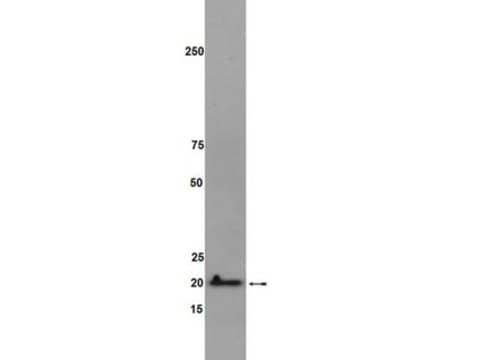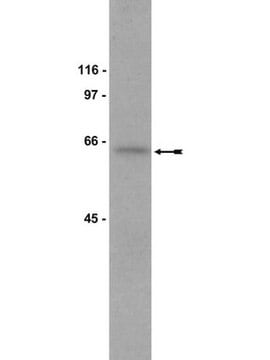05-723
Anti-RhoE/Rnd3 Antibody, clone 4
ascites fluid, clone 4, Upstate®
Synonym(s):
MemB protein, Rho family GTPase 3, ras homolog gene family, member E, small GTP binding protein Rho8
About This Item
Recommended Products
biological source
mouse
Quality Level
antibody form
ascites fluid
antibody product type
primary antibodies
clone
4, monoclonal
species reactivity
mouse, human
manufacturer/tradename
Upstate®
technique(s)
immunocytochemistry: suitable
western blot: suitable
isotype
IgG
NCBI accession no.
UniProt accession no.
shipped in
dry ice
target post-translational modification
unmodified
Gene Information
human ... RND3(390)
General description
Specificity
Immunogen
Application
A 1:50 dilution of this antibody has been reported by an independent laboratory to show positive immunostaining for RhoE/Rnd3 in 3T3/A31 cells fixed with paraformaldehyde and permeabilized by Triton X-100 (Riento, K., 2003).
Signaling
Cytoskeletal Signaling
Quality
Western Blot Analysis:
A 1:500-1:2000 dilution of this lot detected RhoE/Rnd3 in RIPA lysates from 3T3/A31 cells.
Target description
Physical form
Storage and Stability
Analysis Note
Positive Antigen Control: Catalog #12-305, 3T3/A31 lysate. Add 2.5 μL of 2-mercapto-ethanol/100 μL of lysate and boil for 5 minutes to reduce the preparation. Load 20 μg of reduced lysate per lane for minigels.
Other Notes
Legal Information
Disclaimer
Not finding the right product?
Try our Product Selector Tool.
Storage Class Code
10 - Combustible liquids
WGK
WGK 1
Certificates of Analysis (COA)
Search for Certificates of Analysis (COA) by entering the products Lot/Batch Number. Lot and Batch Numbers can be found on a product’s label following the words ‘Lot’ or ‘Batch’.
Already Own This Product?
Find documentation for the products that you have recently purchased in the Document Library.
Our team of scientists has experience in all areas of research including Life Science, Material Science, Chemical Synthesis, Chromatography, Analytical and many others.
Contact Technical Service








